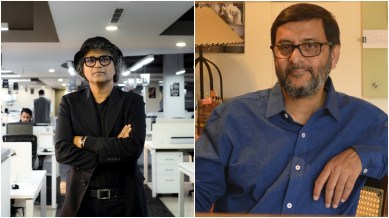JLF 2024: Does fiction matter? Vivek Shanbhag and Raj Kamal Jha answer
Shanbhag and Jha on their latest novels, Sakina’s Kiss and The Patient in Bed Number 12, and the role of fiction in a fact-ridden society

In a craft talk pegged to their latest novels, writers Vivek Shanbhag and The Indian Express chief editor Raj Kamal Jha discussed the origins of Sakina’s Kiss and The Patient in Bed Number 12 respectively, as well as the narrative structure that allowed those stories to bloom. On day three of Jaipur Literature Festival 2024, they were in conversation with Anil Aneja, head, English department, Delhi University.
“It’s difficult to put my finger on where the inspiration came from, for any book of mine. Telling a story is very important, and if I try to explain it, I’ll probably simplify it. I feel the change of globalisation in the last 30 years is very significant in India. We think we understand it, but we don’t, and that’s what I tried to capture in this book,” said Shanbhag.
monthly limit of free stories.
with an Express account.
“The motivation for the book remains what first drew me to journalism, the search for spaces where people live with their secrets. We live more in those spaces, not necessarily in those where we hotly debate and contest ideas. As everything gets more polarised, this middle space gets emptier. This book was my search for what happens to us in this space, where it doesn’t matter who we vote for,” said Jha.
On book titles, Shanbhag referred to the importance of symbolic relevance. “I’m sure you have experienced being 20 pages into the book, but not remembering the title. With my previous novel, Ghachar Ghochar, the suggestion was that the experience of the work can’t be understood by what you already know — so I chose a nonsense phrase. Sakina’s Kiss also captures the central metaphor of the book,” he said.
Jha added that the title was his editor Manasi Subramaniam’s idea and it had instantly struck a chord. “In the times we live in, everything is a marker of identity, a provocation for an opinion. In a hospital, it’s difficult to take a stand on the patient in bed number 12. Are you ‘pro’ the patient or ‘anti’ the patient? The title only signals vulnerability,” he said, a running theme in the book.
Where Shanbhag’s novel spans three days with multiple flashbacks, Jha’s uses the protagonist — a hospitalised father with an estranged daughter — to hop into the heads of many characters who flit through the hospital lobby.
“Timelines are a complex thing in fiction. I look for a point in time for a character where they can look at their past, present, and possibly future. Once a writer finds that, the character’s lives, interactions and relationships start coming out in a different light,” said Shanbhag.
“For most of us, it’s difficult to live solitary lives. Our paths intersect with a range of people the moment we step out of our homes. Even inside our home. You have to flit through so many lives that live next door to each other, all interconnected. This also defined the form of the novel,” said Jha.
Since both authors have worked as journalists, they commented on what it is about made-up stories that attracted them apart from factual storytelling.
“It gives you a certain distance to examine your own experiences. Many people ask me if it’s my experience. That question is immaterial because if you write a novel with such intensity and know so much about a character’s details, I can’t say it’s not my experience. It becomes my experience,” said Shanbhag.
“Most of the time, we are hijacked by and attracted to the extremes. The bell in the bell curve is boring, not something we talk about. It’s where we struggle with our fears and hopes, both fictions, both imagined and real at the same time. Fiction allows us to understand that,” said Jha.